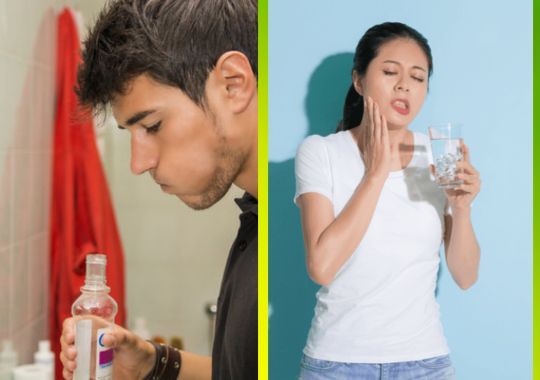Invisalign has revolutionized the world of orthodontics by providing a discreet and convenient alternative to traditional braces. These transparent aligners offer a comfortable and virtually invisible way to straighten teeth. However, in this article, we'll look at Gargling salt water with Invisalign and maintaining proper oral hygiene during Invisalign treatment is crucial for optimal mouthwash results and overall oral health.
As Amazon affiliates we may earn a commission if you purchase a product at no cost to you

Watch this interesting video.
Gargling Salt Water: An Effective Routine for Invisalign Wearers
Maintaining good oral hygiene is crucial when undergoing Invisalign treatment. While the clear aligners offer a discreet way to straighten your teeth, they can also create an environment where bacteria can thrive if proper care is not taken. One effective and affordable practice to incorporate into your daily Invisalign routine is gargling salt water. Let's explore why gargling salt water is beneficial and how you can make it a part of your oral care routine.
Benefits of Gargling Salt Water with Invisalign
Gargling salt water helps reduce the growth of bacteria in your mouth, which can contribute to bad breath and oral infections. The saline solution creates an environment that is less conducive to bacterial growth, helping to freshen your breath and keep your mouth clean.
Alleviation of Discomfort and Irritation
During the initial stages of wearing Invisalign aligners, you may experience some discomfort or irritation as your teeth adjust. Gargling salt water can provide temporary relief by soothing any inflammation or soreness in your mouth. The gentle saltwater rinse can help reduce discomfort and make wearing your aligners more comfortable.
Accelerated Healing and Reduced Risk of Infection
If you have any small cuts, sores, or irritations in your mouth, gargling salt water can aid in the healing process. The saltwater solution has antiseptic properties that can help prevent infection and promote faster healing of minor mouth injuries. This is especially beneficial during Invisalign treatment when the aligners can sometimes rub against the gums or soft tissues.
How to Prepare Salt Water Solution for Gargling
Preparing a salt water solution for gargling is quick and easy. Follow these simple steps:
Start with a clean glass or cup and fill it with warm water.
Add approximately half a teaspoon of salt to the water.
Stir the mixture until the salt dissolves completely.
Take a sip of the salt water and gargle it in your mouth for about 30 seconds, making sure to swish it around your teeth and gums.
Spit out the salt water into the sink and rinse your mouth with plain water.
Frequency and Timing for Gargling
To reap the benefits of gargling salt water, incorporate it into your daily oral care routine. Gargle with salt water at least once a day, preferably after brushing your teeth. You can also gargle salt water after meals or whenever you feel the need to freshen your breath or alleviate any discomfort.
Remember, while gargling salt water is beneficial, it is not a substitute for regular brushing, flossing, and routine dental visits. It should be used as a supplemental practice to maintain optimal oral health during your Invisalign treatment.

Benefits of Gargling Salt Water with Invisalign
Gargling salt water with Invisalign can significantly reduce bacterial growth in your mouth, helping to combat bad breath and promote overall oral hygiene. Salt has natural antibacterial properties that can inhibit the growth of bacteria responsible for causing odors and oral infections. By incorporating salt water gargling into your routine, you can keep your breath fresh and minimize the risk of developing oral health issues.
Alleviation of Discomfort and Irritation
Wearing Invisalign aligners may cause some initial discomfort or irritation as your teeth gradually shift into their desired positions. Gargling salt water can provide temporary relief from this discomfort. The gentle saline solution can help soothe any inflammation or soreness in your mouth, making the aligner-wearing experience more comfortable. It acts as a natural mouthwash, creating a soothing effect that can alleviate any discomfort associated with the aligners.
Accelerated Healing and Reduced Risk of Infection
In the course of your Invisalign treatment, you may experience small cuts, sores, or irritations in your mouth due to the aligners' presence. Gargling salt water aids in the healing process by promoting faster recovery and reducing the risk of infection. The saltwater solution acts as a mild antiseptic, helping to cleanse and protect the affected areas. It can also help reduce swelling and inflammation, allowing for quicker healing of minor mouth injuries.
By incorporating the practice of gargling salt water into your Invisalign routine, you can enjoy these benefits and contribute to better oral health throughout your treatment. However, it's important to note that while gargling salt water is beneficial, it is not a substitute for regular oral hygiene practices such as brushing, flossing, and maintaining regular dental visits.
In the next section, we will discuss how to prepare the salt water solution for gargling, as well as some precautions to keep in mind while performing this practice with Invisalign.
How to Prepare Salt Water Solution for Gargling
Creating a salt water solution for gargling with Invisalign is a simple process. Follow these step-by-step instructions:
Start with a clean glass or cup and fill it with warm water. It's important to use warm water as it helps dissolve the salt effectively and enhances the soothing effect.
Add approximately half a teaspoon of salt to the water. You can use either regular table salt or sea salt. Avoid using iodized salt or salt with added flavorings.
Stir the mixture well until the salt is completely dissolved. Ensure that the salt is thoroughly mixed with the water to create a consistent saline solution.
Take a sip of the salt water and gargle it in your mouth for about 30 seconds. Tilt your head back slightly and swish the solution around your teeth and gums, ensuring it reaches all areas of your mouth. Take care not to swallow the salt water.
Spit out the salt water into the sink and rinse your mouth with plain water. This step helps remove any remaining salt residue and leaves your mouth feeling refreshed.
Recommended Frequency and Timing for Gargling
To fully benefit from gargling salt water with Invisalign, it's important to incorporate it into your daily oral care routine. Here are some recommendations for the frequency and timing of gargling:
- Gargle with salt water at least once a day, preferably after brushing your teeth. This ensures that your mouth is already clean before performing the salt water rinse.
- Consider gargling salt water after meals to remove any food particles and bacteria that may have accumulated during eating. This can help maintain a clean and healthy mouth throughout the day.
- If you experience any discomfort or irritation from your Invisalign aligners, you can gargle salt water as needed for temporary relief. It can provide a soothing effect and minimize any discomfort you may be experiencing.
Remember, while gargling salt water can provide numerous benefits, it should not replace regular oral hygiene practices such as brushing and flossing. It should be used as an additional measure to support your oral health during Invisalign treatment.
In the next section, we will discuss some precautions to consider while gargling salt water with Invisalign to ensure safe and effective use.
Precautions to Consider While Gargling Salt Water with Invisalign
When incorporating gargling salt water into your Invisalign routine, it's important to be aware of certain precautions to ensure safe and effective use. Let's explore these precautions:
Potential Side Effects and Risks
While gargling salt water is generally safe, some individuals may experience certain side effects or risks. These can include:
- Dryness or irritation: Excessive or prolonged use of salt water gargles may lead to dryness or irritation in the mouth. If you experience any discomfort or dryness, it's advisable to reduce the frequency of gargling or consult your dentist.
- Salt sensitivity: Some people may be sensitive to the taste or effects of salt water. If you have a known sensitivity or allergy to salt, it's best to avoid gargling salt water or use alternative oral rinses.
- Imbalance of oral microbiome: Salt water gargles can disrupt the natural balance of bacteria in the mouth. While this can be beneficial in reducing harmful bacteria, it's important to maintain a healthy balance of oral flora. If you have any concerns, consult your dentist for guidance.
Consultation with Orthodontist or Dentist
Before incorporating any new practices into your Invisalign routine, it's advisable to consult with your orthodontist or dentist. They can provide personalized guidance based on your specific dental needs and ensure that gargling salt water is suitable for you.
Your orthodontist or dentist can also provide recommendations on the frequency and timing of salt water gargles based on your treatment progress and oral health condition. They may suggest additional oral care practices or modifications to your routine to enhance the effectiveness of your Invisalign treatment.
Regular communication with your orthodontist or dentist throughout your Invisalign journey is essential to address any concerns, monitor your progress, and ensure optimal oral health.
By considering these precautions and seeking professional guidance, you can safely incorporate gargling salt water into your Invisalign routine and reap its benefits.
In the next section, we will explore alternative options for oral care with Invisalign, providing you with additional choices to maintain excellent oral hygiene during your treatment.

Alternative Options for Oral Care with Invisalign
While gargling salt water is a popular and effective practice for maintaining oral hygiene with Invisalign, there are alternative options you can consider. These alternatives can provide additional benefits and complement your oral care routine. Let's explore some of these options:
Mouthwash and Oral Rinses
Using mouthwash or oral rinses is an excellent way to supplement your Invisalign oral care routine. Mouthwash can help kill bacteria, freshen breath, and reach areas that may be difficult to clean with brushing and flossing alone. Look for mouthwashes specifically formulated for orthodontic patients or those that are alcohol-free, as alcohol-based mouthwashes may cause dryness or irritation.
To use mouthwash, swish the recommended amount in your mouth for the specified duration as mentioned on the product label. Ensure that you thoroughly rinse your mouth to remove any residue before wearing your Invisalign aligners.
Hydrogen Peroxide Solutions
Hydrogen peroxide solutions can provide additional antibacterial and antimicrobial benefits for oral care. Diluted hydrogen peroxide can help reduce the presence of harmful bacteria in your mouth and minimize the risk of infections. It is important to use hydrogen peroxide solutions in the recommended concentration and follow the instructions provided by your dentist or orthodontist.
To use hydrogen peroxide solution, mix it with water according to the recommended ratio. Swish the solution in your mouth for the specified duration, ensuring that you do not swallow it. Rinse your mouth thoroughly with plain water before wearing your Invisalign aligners.
Baking Soda Solutions
Baking soda, also known as sodium bicarbonate, has natural cleansing and antibacterial properties that can help maintain oral hygiene. Creating a baking soda solution can provide an effective alternative for oral care with Invisalign.
To make a baking soda solution, mix half a teaspoon of baking soda with warm water to form a paste or a solution. Gently swish the solution around your mouth, making sure to reach all areas. Spit out the solution and rinse your mouth thoroughly with water. This can help freshen your breath and reduce the presence of bacteria.
It's important to note that while these alternative options can enhance your oral care routine with Invisalign, they should not replace regular brushing, flossing, and routine dental visits. Consult with your dentist or orthodontist to determine which options are suitable for your specific needs.
Conclusion
Maintaining proper oral hygiene is crucial when undergoing Invisalign treatment, and incorporating salt water gargling into your daily routine can provide significant benefits. By following the recommended frequency and timing for gargling, you can enhance your oral care regimen and maximize the effectiveness of your treatment with mouthwash for Invisalign.
Recommended Article

Frequently Asked Questions FAQs
Is gargling salt water with Invisalign aligners effective in reducing bacteria?
Gargling salt water with Invisalign aligners can help reduce bacterial growth in the mouth, contributing to improved oral hygiene and fresher breath.
How often should I gargle salt water with Invisalign?
It is recommended to gargle salt water with Invisalign at least once a day, preferably after brushing your teeth. However, consulting with your orthodontist or dentist will provide personalized guidance based on your specific needs.
Are there any risks associated with gargling salt water with Invisalign?
Gargling salt water is generally safe, but it's important to be cautious of potential side effects such as dryness or irritation. If you experience any discomfort, it is advisable to reduce the frequency or seek professional advice.











